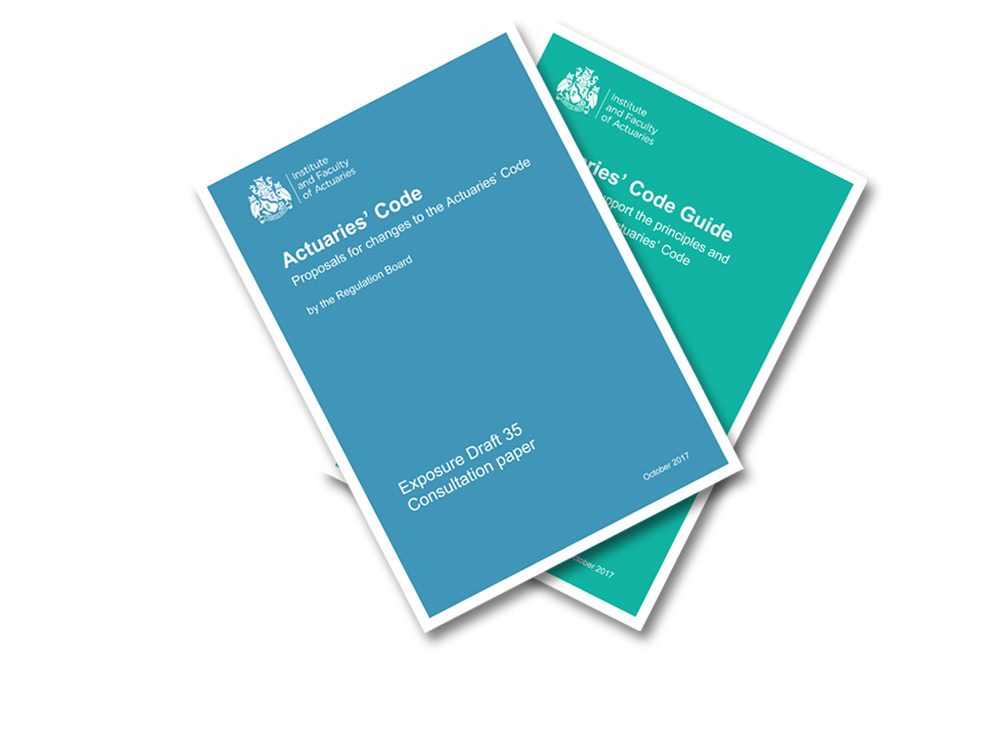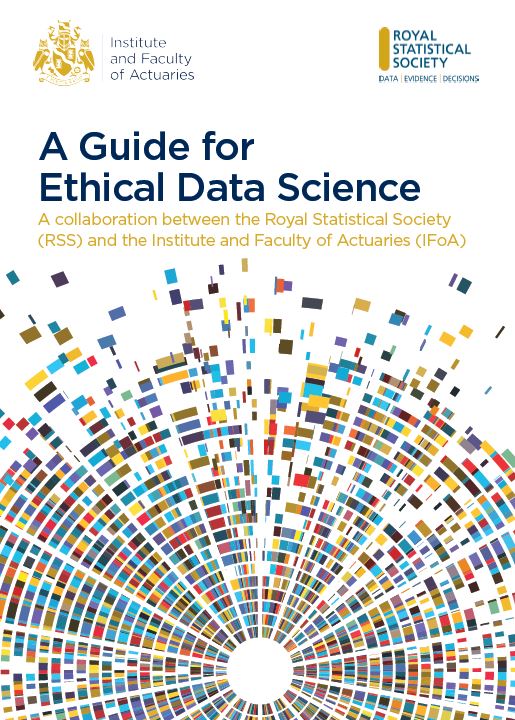19 December 2019
2019 Regulatory Round-up – a recap of this year's regulatory news
Welcome to our roundup of the key regulatory news from 2019, bringing you up to speed on important changes to the Standards Framework of the IFoA as well as any regulatory initiatives that you might have missed over the course of the year.
 Revised Actuaries’ Code came into force
Revised Actuaries’ Code came into force
On 18 May the revised Actuaries’ Code came into force. The Code now has six principles:-
- Integrity
- Competence and Care
- Impartiality
- Compliance
- Speaking up
- Communication
Each principle is supported by a number of amplifications that clarify specific requirements of the principles for some particular issues. The purpose of the revised Code was to make it even more principles-based, to clarify the extent of the requirements, and to make it more appropriate for an increasingly diverse IFoA membership.
Guidance to support members in understanding their obligations and applying the Code in practice was also published and is essential reading for all members.
New guidance on speaking up, conflicts of interest and members acting as NEDs
Coinciding with the publication of the revised Actuaries’ Code, May also saw the publication of updated guidance for members on conflicts of interest and speaking up. The Guides are included in the general Guidance to the Code and are also available as stand-alone documents.
Guidance on professional considerations, practical hints and frequently asked questions for IFoA members acting as Non-Executive Directors was also published in May, together with related case studies.
JFAR Risk Perspective
In May the Joint Forum on Actuarial Regulation (JFAR) published its Risk Perspective: 2018 Update.
In the JFAR risk perspective, climate-related risks were again highlighted as being of key importance to actuaries. JFAR reiterated the nature of the risks that actuaries should now be considering in their work, highlighted some of the recent developments and provided links to a number of useful reference documents.
Risk Alert: Disclosure of information relating to models
On 13 May, the IFoA issued a risk alert around the disclosure of information relating to models. The main message contained in the risk alert is that ‘Members must disclose to their own client and, in some circumstances, fellow actuaries, an appropriate level of information in relation to the model they are relying on’.
 New Chair of the Disciplinary Board
New Chair of the Disciplinary Board
In February the IFoA appointed Stephen Redmond as Lay Chair of its Disciplinary Board. Stephen has a wealth of experience in professional discipline built from appointments across a wide range of regulated sectors and has worked extensively with regulatory bodies in the UK and internationally. You can find out more about Stephen on the IFoA’s website.
 New Chair of the Regulation Board
New Chair of the Regulation Board
In July the IFoA appointed Neil Buckley as Lay Chair to the Regulation Board. Prior to joining the IFoA, Neil was the Chief Executive of the Legal Services Board, the oversight body for the legal regulators in England and Wales. You can learn more about Neil here.
New Professional Skills videos
In September we published a new suite of Professional Skills videos and supporting materials to assist Members in meeting their Stage 3 PST requirements. The Professional Skills resources can be accessed here. A ‘Train the Trainer’ Toolkit with comprehensive resources and downloadable links to the videos is available from the Professional Skills team and is designed to help Members facilitate high quality, interactive sessions within their organisations and local actuarial societies.
Launch of AMS Thematic Review Programme
On 20 September the IFoA announced two thematic reviews as part of its new Actuarial Monitoring Scheme (AMS).
The first two reviews will be carried out in 2020 and are focused on themes in the areas of General Insurance and Pensions that have been identified as having the potential to provide useful insight. These will involve a review of how that work is being carried out in practice by actuaries, including review of the work itself, which will allow the IFoA to share useful learning and good practice with Members and their employers. The outputs of the reviews will be used by the IFoA to ensure its standards, guidance, CPD events and qualifications are as effective and relevant as possible, helping it to safeguard the reputation of the profession and serve the wider public interest.
The two topics are:
- Pensions: Actuarial factors used to calculate member benefits
- Insurance: Role of actuarial advice in pricing of specific GI products
The Thematic Review Programme will be delivered by a new Actuarial Review Team, led by David Gordon who joins the IFoA from Willis Towers Watson.
 Guide for Ethical Data Science
Guide for Ethical Data Science
In October, the IFoA published, jointly with the Royal Statistical Society (RSS) a new ethical framework for Members and other practitioners working in the field of data science.
The Guide seeks to provide practical support to members on ethical practice. Structured around five core ethical themes, the Guide provides examples of common ethical challenges in the field and explains how those ethical themes would apply in each.
New standard published – APS X4: Financial Analysis of Social Security Programmes
Actuarial Profession Standard (APS) X4 was published on 27 November, along with a paper summarising the feedback to the consultation that was carried out earlier in the year.
APS X4 applies to members carrying out actuarial work in the financial analysis of Social Security Programmes outside of the UK Geographic Scope.
Members carrying out such work within the UK Geographic Scope must apply the Financial Reporting Council’s Actuarial Statement of Recommended Practice (ASORP 1).
APS X2: Review of Actuarial Work – new resource materials
In November the IFoA refreshed its online materials on Actuarial Profession Standard (APS) X2: Review of Actuarial Work. The new webpage contains a host of resource materials for Members, including case studies, vignettes, and an APS X2 quiz. This follows the conclusion of a post-implementation review of APS X2 which looked at how the standard is working in practice and whether it is effective and achieving its objectives.
Review of CPD Scheme
Regulation Board began a substantive review of the CPD requirements for members. The objective is to produce a more effective, simpler CPD scheme that better reflects the IFoA membership and is more user-friendly. The scheme will incorporate aspects of the outcomes-focused CPD scheme currently being piloted in some QAS organisations. The review also aims to take account of different ways of learning, allowing more activities to be counted towards CPD and to consider how the burden of recording can be reduced.
Pilot of Outcomes Focused CPD Scheme
The pilot of the outcomes-focused CPD scheme is drawing to an end, and the results will be published in the New Year. From the data gathered, it is clear the pilot has been an overwhelming success for participating members and the seven QAS accredited organisations that implemented the scheme.
This approach has undoubtedly driven more meaningful, effective CPD with members reporting that they are deriving more value and benefit from their activities. The findings have been taken into account in shaping the proposals for the new IFoA CPD scheme.
Consultation on new APS X5
The IFoA is consulting on proposals to withdraw GN30 – Compensation for Professional Shortcomings and replace it with a new APS implementing broadly the same requirements. The proposed APS X5: Compensation for Professional Shortcomings requires Members that are Principals in Organisations that provide actuarial services to external clients to ensure that Appropriate Arrangements are in place in relation to compensation for loss caused by professional shortcomings.
The proposed new APS is not designed to impose any new obligations on Members, rather it aims to provide clarification on the current requirements and provide consistency for Members. The proposal includes non-mandatory guidance to support APS X5 designed to assist Members in meeting their obligations. The consultation will close on 17 February 2020.
New QAS accreditations
 The QAS accredited 6 new organisations this year, including its first accreditation to an organisation in Africa.
The QAS accredited 6 new organisations this year, including its first accreditation to an organisation in Africa.
Congratulations to our most recent QAS accredited organisations:
- Little & Company (Northern Ireland)
- Lux Actuaries & Consultants (Dubai)
- AIA Thailand, Actuarial Department (Thailand)
- XPS Pensions Group plc
- Broadstone Corporate Benefits Limited
- Zamara Actuaries, Administrators & Consultants Limited (Actuarial Division) (Africa)
Please contact the QAS team if you are interested in learning more.
Get in contact
If you have any queries regarding the regulation of the profession or your professional requirements, please do get in touch.

 Revised Actuaries’ Code came into force
Revised Actuaries’ Code came into force New Chair of the Disciplinary Board
New Chair of the Disciplinary Board New Chair of the Regulation Board
New Chair of the Regulation Board Guide for Ethical Data Science
Guide for Ethical Data Science